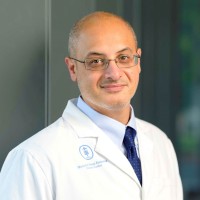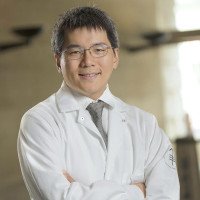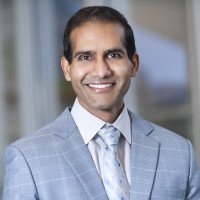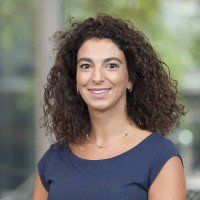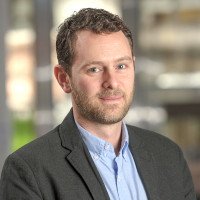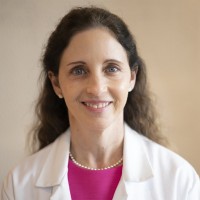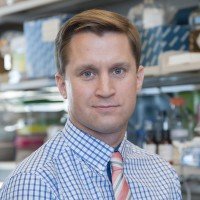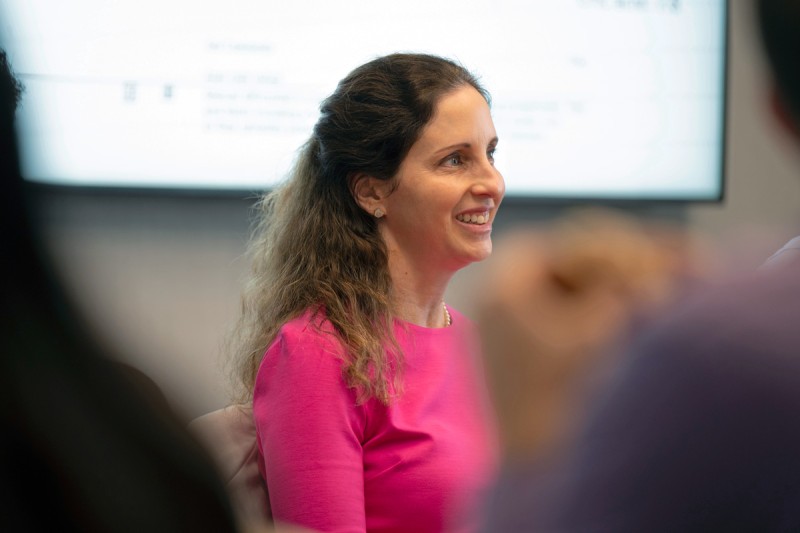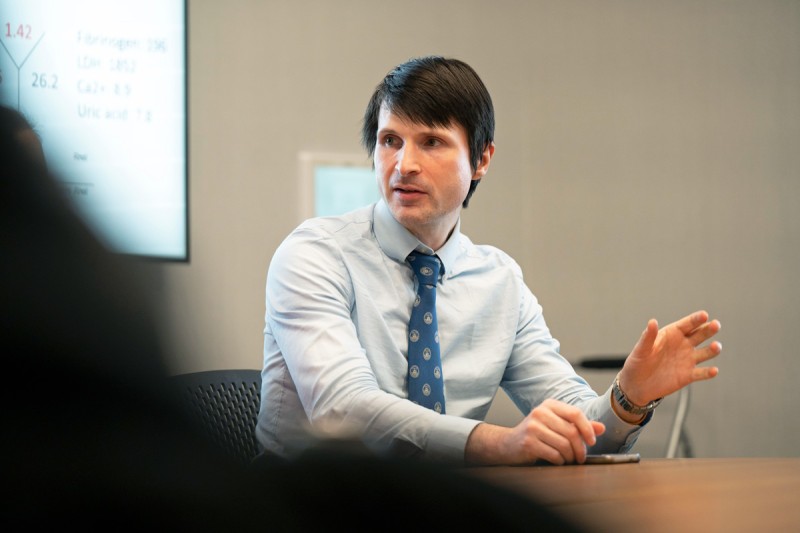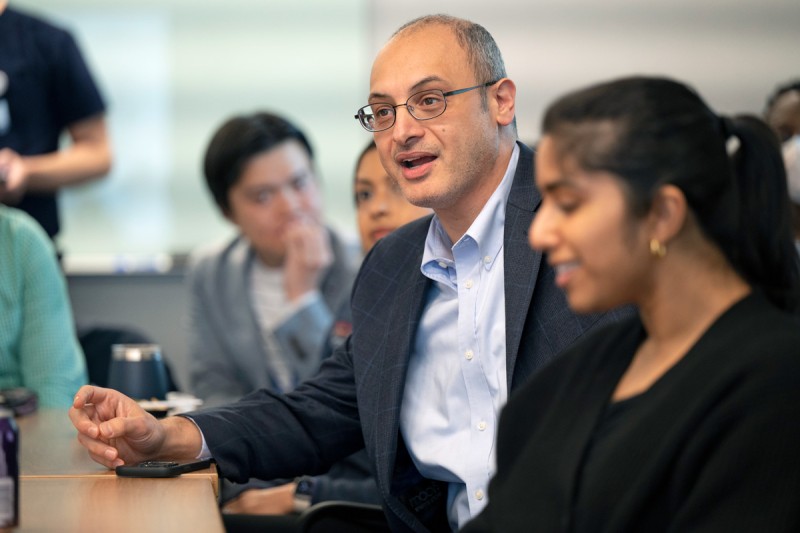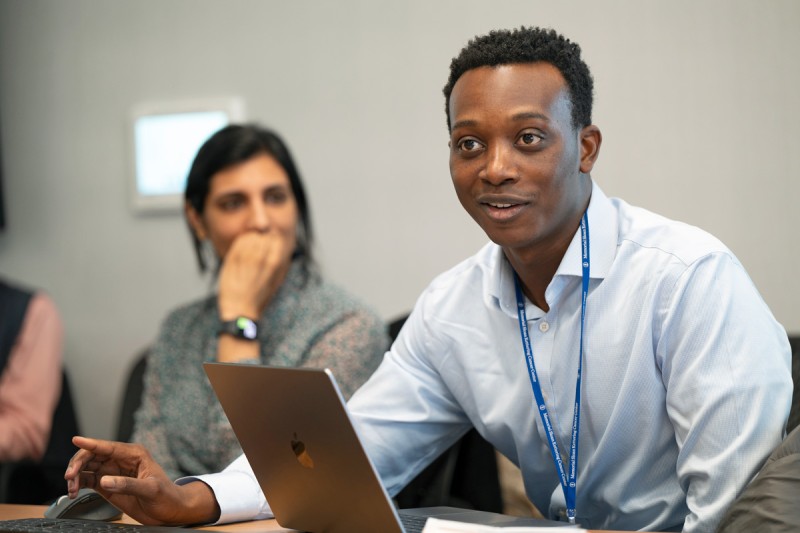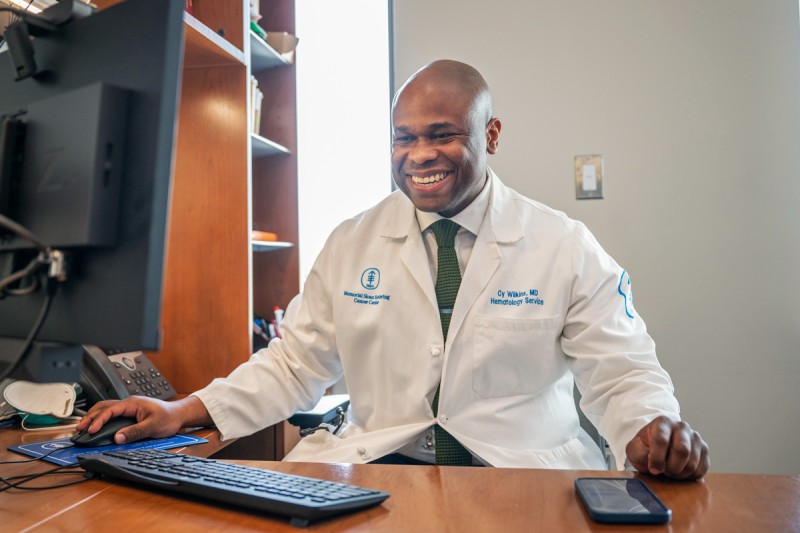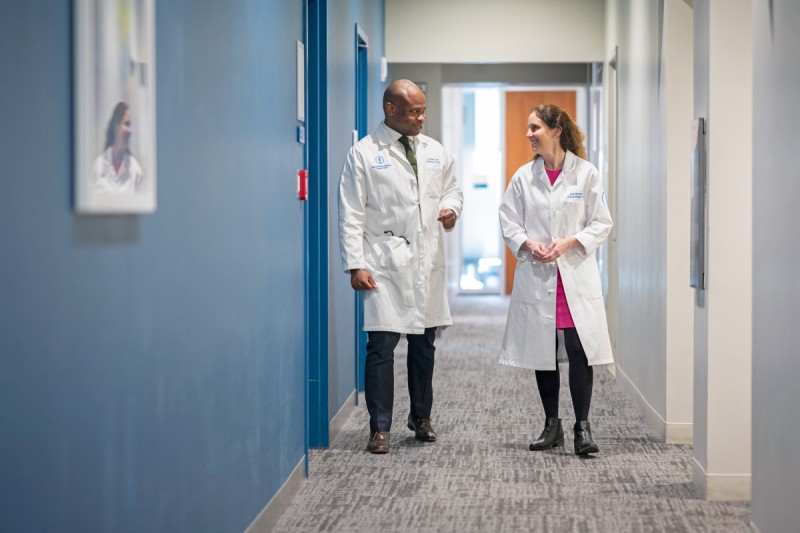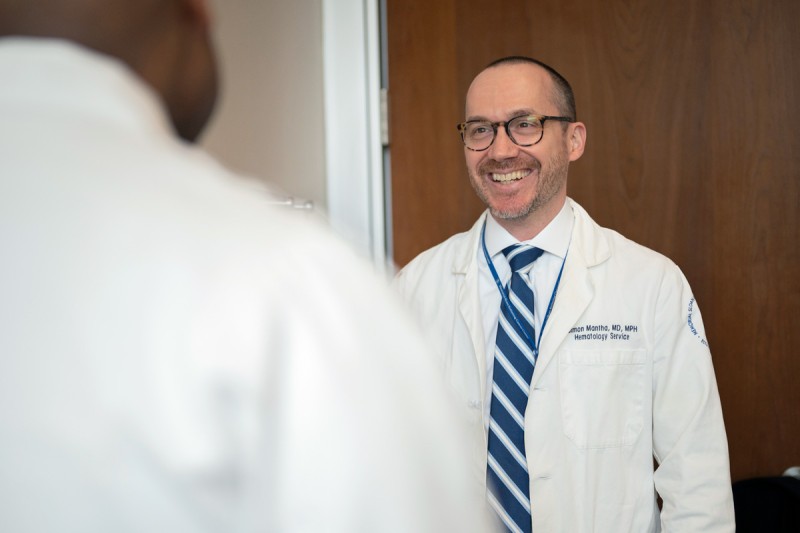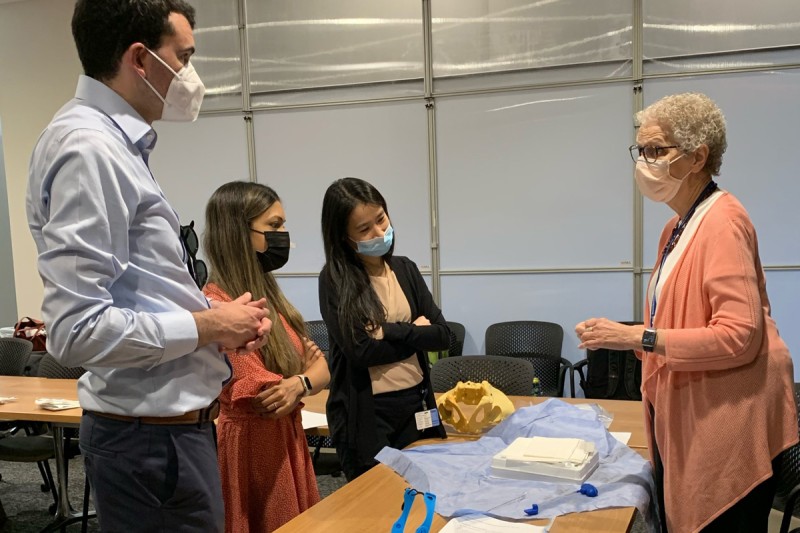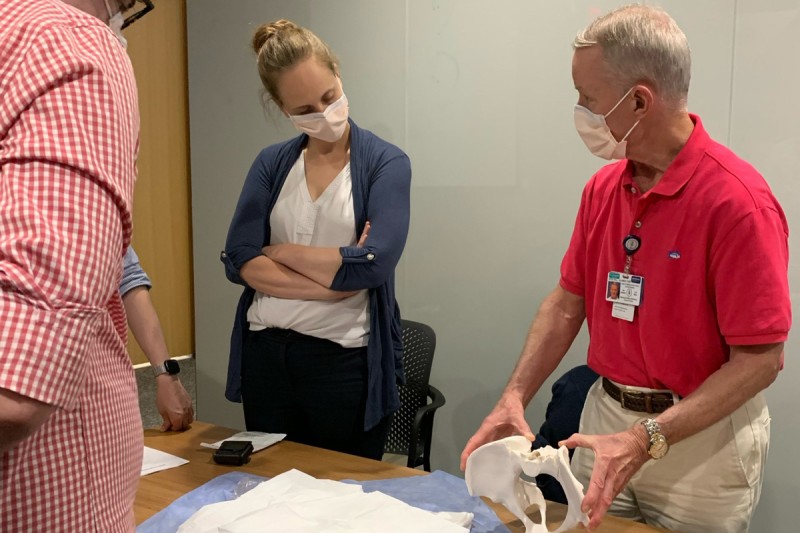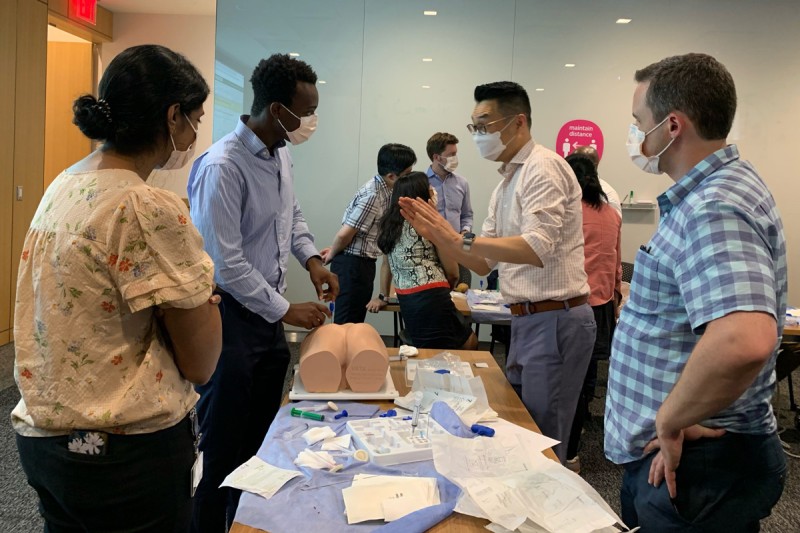The mission of our ACGME-accredited hematology track is to provide trainees with the breadth and depth of clinical and research training to become future physician-scientist leaders and accomplished investigators in malignant and non-malignant hematology, including bone marrow transplantation and cutting edge cellular immunotherapeutics. The hematology track will be an integral part of the traditional medical oncology/hematology fellowship track at Memorial Sloan Kettering Cancer Center, with similarly rigorous training and a focus on hematologic conditions. In their first year, fellows on the hematology track will complete their clinical training in all aspects of hematology, including malignant and non-malignant hematology and cellular-based immunotherapy.
With guidance from the program leadership, fellows will begin the process of research mentor selection from faculty in the tri-institutional collaboration (MSK, Weill-Cornell Medical Center, and Rockefeller University) during their first year of fellowship. Having access to world-class investigators within this tri-institutional collaboration provides hematology fellows opportunities to work with faculty conducting cutting-edge basic and translational research.
In their second and third years of fellowship, the majority (> 80%) of time is protected for research and scholarly activities. Fellows will continue to refine their clinical skills and gain independence in the upper years of fellowship through engagement in half-day, weekly hematology continuity clinics.
Recruitment Mission Statement
- We seek to recruit applicants with a desire to become independent clinical and basic science investigators and thought leaders in the field of hematology.
- We aim to prepare fellows for clinical and academic autonomy.
- We strive to provide comprehensive clinical training in malignant and benign hematology, stem-cell transplant, and cellular based therapeutics.
- Through our recruitment processes, we aim to promote diversity within an inclusive culture encompassing all our trainees and staff.
Program Description
The hematology fellowship will model that of MSK’s highly successful traditional medical oncology/hematology track while incorporating innovative training in:
- Laboratory medicine
- Transfusion medicine
- Clonal hematopoiesis/clinical genomics
- Cellular-based therapeutics
- Transition medicine/adolescent and young adult (AYA) care elective
During their first year of fellowship, hematology fellows will participate in the same didactic instruction (see below) as fellows in the traditional medical oncology/hematology track. There is also a seminar on financial toxicity of cancer care. Examples of hematology-focused didactic training that occurs throughout the academic year include a benign hematology core curriculum, service-specific journal clubs, and multi-disciplinary case conferences.
In their first year, hematology fellows will spend their Friday afternoons learning about malignant hematology, select medical oncology topics, and rotating through our transfusion medicine service with traditional medical oncology/hematology track fellows.

Clinical Training
A comprehensive clinical training experience is provided through a mix of both ambulatory clinics and inpatient rotations at MSK and Weill-Cornell Medical Center (WCMC; see example below). All clinical training requirements are completed in the first year of fellowship. The year is divided into 16 discrete blocks (see representative 1st Year Fellow Rotations below). Outpatient rotations include bone marrow transplant, leukemia, lymphoma, myeloma, clonal hematopoiesis and benign hematology at both MSK and Cornell. Inpatient rotations include leukemia, bone marrow transplant, cellular therapy, and benign hematology (MSK and Cornell). Fellows will also spend time on the laboratory medicine and transfusion medicine services in their first year. Finally, fellows will spend one week at the MSK Ralph Lauren Center (RLC) in East Harlem, New York, where most patients come from underserved populations.
For the duration of their training, hematology fellows will have a continuity clinic divided into six-month intervals each year in both malignant and non-malignant hematology. To best equip fellows with the skills needed to manage this diverse array of patients, fellows will also rotate through clinics at WCMC/New-York Presbyterian. WCMC rotations include hematologic complications of pregnancy, hemoglobinopathies, and hemophilia clinics.
In addition, hematology fellows will spend time on the inpatient and outpatient Cellular Therapy Service at MSK, where they will care for patients receiving chimeric antigen receptor (CAR) T cell and other novel immunotherapeutics.
The first year also includes elective opportunities for clinical training in adolescent and young adult (AYA) cancers, transition medicine, clinical genetics, early drug development, and supportive care.
Clinical work in the second year consists of an ambulatory continuity clinic divided between malignant and benign hematology. The remainder of fellows’ time is protected for mentored research (see below).
Hematology track fellows share on-call responsibilities with traditional track fellows in year one. On call responsibilities are classified as home call in accordance with ACGME workhour rules and provide experience in responding to hematologic emergencies and complications.
Representative First Year Fellow Rotations
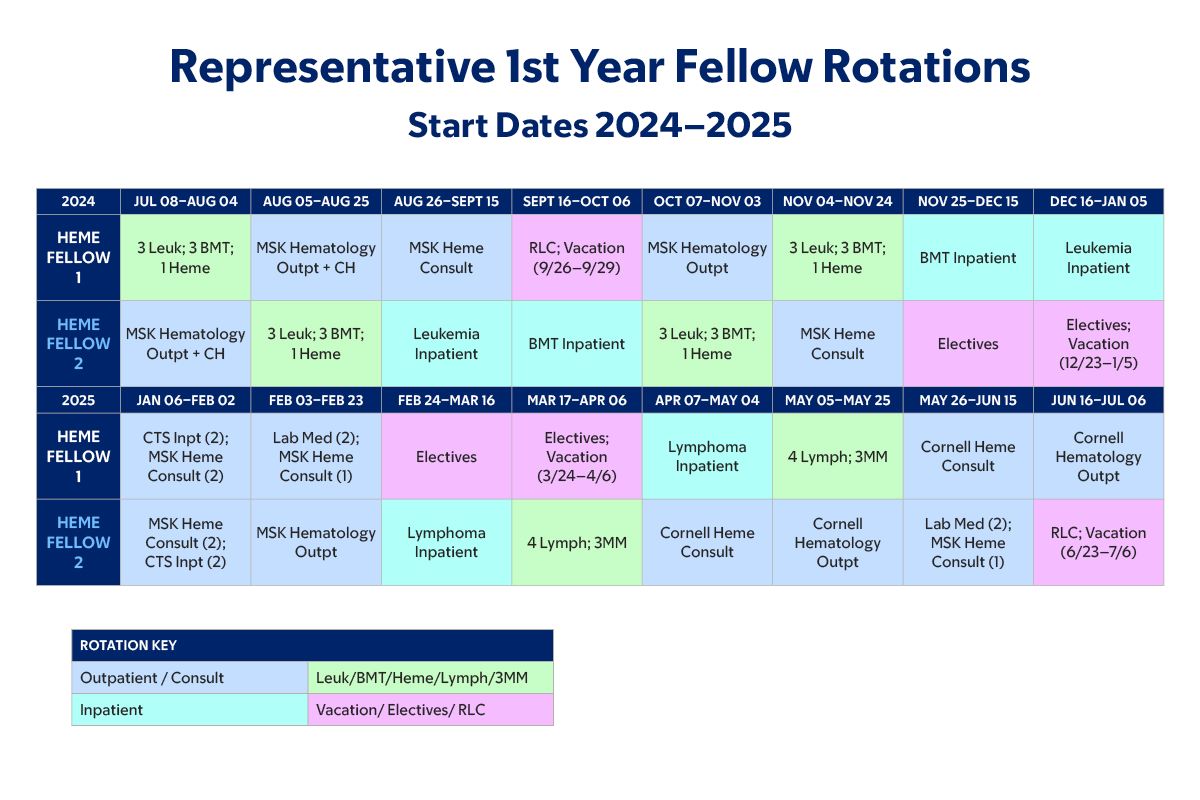
Hematology Fellow Outpatient Clinic Rotations

Research Environment
During year one, fellows will select a research mentor and develop a proposal that describes their academic goals over the remainder of fellowship, as well as a detailed mentorship plan. To ensure that trainees select a mentor whose research focus aligns with theirs, fellows meet frequently with program leadership as part of the mentor selection process.
Dedicated time is afforded to meet with potential preceptors and attend laboratory meetings, providing fellows exposure to the extensive array of research opportunities across the tri-institutional network. Laboratory-based fellows are encouraged to select a second mentor to provide additional research expertise, (e.g., a clinical researcher for a trainee whose primary mentor does not have an MD).
The fellow’s mentor(s) and program leadership meet frequently in the spring of year one to develop the research proposal. Together, they ensure that the project will meaningfully advance scientific knowledge and verify that its aims are feasible during the second and third years of fellowship. This proposal also serves as the foundation for the 10-week experiential grant writing workshop fellows participate in during year two (see below).
In years two and three, fellows have 80% protected time dedicated to mentored research on the project they develop in year one. They will be required to present their work at clinical or laboratory meetings of their respective home services. Fellows will also have the opportunity to present their research to other faculty at a Grand Rounds talk, hosted through the Department of Medicine at MSK.
Grant writing resources: In the summer of year two, all fellows participate in a 10-week grant writing workshop (see table below) that yields a submission-ready research proposal. Participants receive weekly feedback from their peers and from grant-funded faculty members with robust clinical and laboratory-based research portfolios. The course culminates in a mock National Institutes of Health study section where each fellow receives critical feedback from faculty leadership.
Level 1 Grant Writing Workshop Didactics
- Week 1: Introduction to grantsmanship
- Week 2: Hypothesis, specific aims, innovation
- Week 3: Background and preliminary data
- Week 4: Experimental design, methods, potential pitfalls part 1
- Week 5: Experimental design, methods, potential pitfalls part 2
- Week 6: Environment, budget, budget justification
- Week 7: Biostatistics
- Week 8: Submission process presentation: Research & Technology
- Week 9: Mock Review, two weeks after session 8
In addition, all second-year fellows enroll tuition-free in the Clinical Research Methodology Curriculum (CRMC) certificate program offered by the Weill Cornell Clinical and Translational Science Center (CTSC). The curriculum covers regulations and oversight; drug and medical device development; clinical trial design; and research in outcomes, biological markers, early detection, epidemiology, and chemoprevention.

Life on the Upper East Side
Memorial Sloan Kettering Cancer Center offers housing to most incoming fellows in the immediate vicinity of the medical center on the upper east side of New York City. The upper east side is a very safe neighborhood with ample access to waterfront (East River jogway/walkway), walking distance to Central Park, and home to many families with young children and excellent schools. The upper east side is also home to many world renown hospitals in addition to our own, including New York Presbyterian- Weill Cornell and Hospital for Special Surgery, and the Rockefeller University. The rest of the city is easily accessible via subway, particularly from the number 6 and Q lines.
There is ample opportunity for fellows to socialize with other fellows across the institution. The Hematology fellowship program hosts an annual retreat, as well as events such as ice-cream socials and a summertime picnic in Central Park.
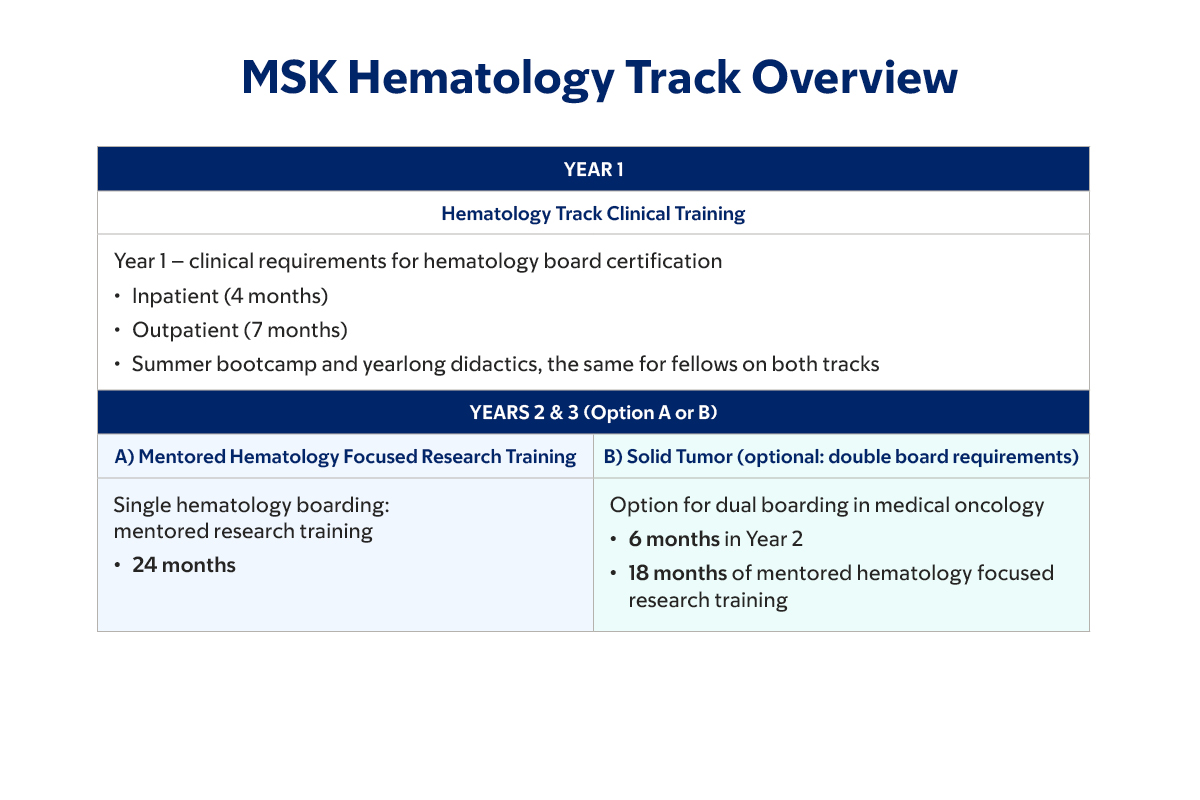
Why Choose MSK for Fellowship Training
As a National Cancer Institute-designated Comprehensive Cancer Center, Memorial Sloan Kettering Cancer Center (MSK) offers fellows a wealth of resources to support their clinical and research training and career development. In addition to its 33 core research facilities and comprehensive administrative, technological, and informatics infrastructure, fellows will most directly benefit from the following resources:
- Tri-Institutional Collaboration Network (TCN)—MSK is located adjacent to Weill-Cornell Medicine and Rockefeller University; in 2008, the institutions entered into a tri-institutional partnership aimed at facilitating, fostering, and optimizing collaboration in patient care, research, and training. The TCN enables access to other institutions’ core resources and hosts monthly events, including workshops and seminars on grant writing; understanding and navigating peer review; compliance; and research funding trends.
- Two years of protected research time with extensive hands-on training in grant writing, protocol development, and research methodology through the tuition-free Clinical Research Methodology Course.
- MSK is known for fostering an inclusive and equitable environment, as evidenced by its recognition from Forbes as one of America’s best employers for diversity. MSK has also been highlighted as a leader in non-discrimination by the Human Rights Campaign.
- Innovative learning opportunities, including a 10-part course designed to introduce physicians and scientists to artificial intelligence’s applications in clinical research. A second course taught through the Gerstner Sloan Kettering Graduate School of Biomedical Sciences introduces students to bioinformatics and cancer genomics with hands-on experience using relevant data sets.
- MSK offers many avenues for training in clonal hematopoiesis (CH), including its routine sequencing of tumors and paired normal tissue using its next-generation sequencing platform (MSK-IMPACT®). This provides fellows with an immense resource for research on CH and predicting and managing associated cardiovascular risk. This routine sequencing also identifies many patients with CH of indeterminate potential who are now managed through multi-disciplinary clinics, providing innovative, comprehensive, and mentored training in the counseling and care of these patients.
- Rotations on MSK’s Cellular Therapy Service are critical for fellows’ future academic success, as these modalities expand into the management of both benign and malignant hematologic conditions. MSK remains a leader in the development of novel cellular therapeutics, which are actively being incorporated into clinical trials for hemoglobinopathies and bone marrow failure syndromes. Additionally, MSK continues to lead research into genetically modified stem cell therapies, facilitated by our extensive resources and core facilities. This portfolio of studies, all of which contain embedded correlative analyses, provide fellows with an unparalleled opportunity to serve as active participants in the development and testing of these agents, resulting in a strong foundation for a career in academic hematology.
How to Apply
Our program participates in the Electronic Residency Application Service (ERAS). You can indicate your interest in either the hematology track (2 spots) and/or the traditional medical oncology/hematology Track (14 spots) by applying to the respective ERAS track(s). You can apply to one or both tracks; the track(s) to which you apply will not impact the interview process.
Contact
Hematology and Medical Oncology Fellowship Program Coordinators
Memorial Sloan Kettering Cancer Center
1275 York Avenue, M2102C
New York, NY 10065
212-639-5809
[email protected]
Director
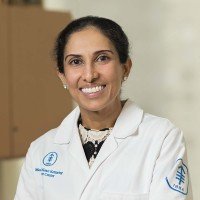
Deputy Director
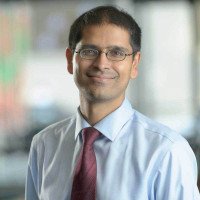
Associate Directors
